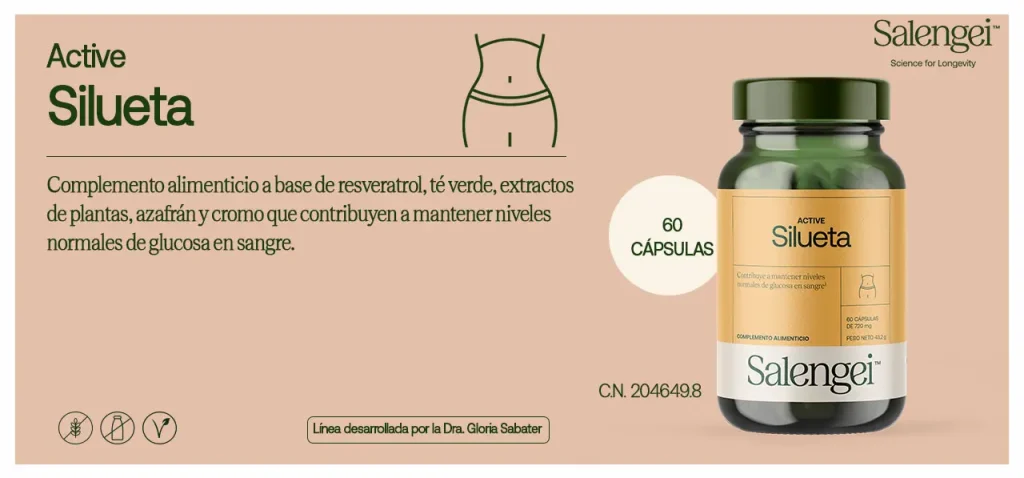Insulin sensitivity and weight loss: Key supplements.

In today’s article, we’ll find out how to maintain normal, healthy blood glucose levels and support weight loss naturally with the benefits of resveratrol, green tea, and other key supplements.
What is hyperglycemia and how does it affect weight loss?
Hyperglycemia occurs when blood glucose levels are elevated. Maintaining optimal blood glucose levels is critical for metabolic homeostasis and overall health. A prolonged glycemic imbalance, such as Hyperglycemia can trigger damage to the vascular endothelium. For example, it can promote atherosclerosis and increase the risk of cardiovascular disease .
In addition, chronic hyperglycemia induces a persistent inflammatory state and contributes to the development of insulin resistance and weight loss, a key factor in metabolic syndrome and obesity. On the other hand, low glucose levels, or hypoglycemia, directly affect the central nervous system, causing symptoms such as confusion, weakness and, in severe cases, loss of consciousness. https://doi.org/10.1089/ars.2009.2484
Maintaining stable glucose not only prevents these complications, but also optimizes energy metabolism, favoring fat oxidation versus lipid storage. Proper glucose control:
- Improves insulin sensitivity
- Reduces postprandial glycemic peaks
- It supports a metabolic environment that facilitates weight loss and the maintenance of muscle mass.
In addition, the assessment of fasting and postprandial glucose levels is crucial to design personalized nutritional and therapeutic interventions, effectively addressing the metabolic needs of each individual.
The importance of maintaining normal blood glucose levels
Glucose is the main source of energy for cells. Its excess or prolonged deficiency can trigger significant damage to vital organs, blood vessels, and nerves. Sustained hyperglycemia, even at slightly elevated but constant levels, is associated with an increased risk of cardiovascular disease, nephropathy, neuropathy, and cognitive decline.
Glycemic homeostasis prevents low-grade systemic inflammation, an underlying factor in insulin resistance and weight loss and the development of multiple metabolic pathologies. Recent studies have shown that maintaining stable glucose levels significantly reduces the incidence of cardiovascular complications and improves life expectancy.
There are crucial differences between fasting glucose and postprandial glucose.
- Fasting glucose reflects the body’s basal metabolic state after at least 8 hours without caloric intake. It is a key indicator for assessing endogenous glucose production and insulin efficiency in the absence of dietary stimuli.
- Postprandial glucose measures the immediate metabolic response after ingestion. It reveals the body’s ability to handle dietary glycemic loads. https://doi.org/10.1016/j.diabres.2022.110195
Reducing your intake of refined sugars and processed carbohydrates is critical. These foods, when metabolized quickly, cause sudden increases in glucose. In turn, as a consequence, abrupt falls are created that stimulate hunger. This promotes a detrimental cycle of excessive intake and fat accumulation, hindering insulin sensitivity and weight loss. 10.1001/jamainternmed.2020.5938

Eating habits, exercise, and stress management to regulate blood glucose
A well-structured nutritional approach is critical to keeping glucose levels stable. Foods rich in fiber, such as legumes, cruciferous vegetables and some seeds, slow down digestion and glucose absorption, avoiding undesirable glycemic spikes.
Lean proteins, such as fish, chicken, and eggs, help maintain satiety and stabilize insulin release. While healthy fats, from olive oil, nuts and avocado, improve insulin sensitivity. Reducing your consumption of refined sugars and processed carbohydrates is crucial. These quickly raise blood glucose, promoting fluctuations that make it difficult to control. https://doi.org/10.1016/j.ajmo.2023.100034
On the other hand, physical exercise is one of the most effective methods to improve insulin sensitivity and facilitate glucose uptake by the muscles. Resistance workouts, such as weightlifting, increase muscle mass, which in turn raises basal metabolism and improves glucose management. Aerobic activities, such as walking, running, or swimming, increase glucose consumption during exercise and improve metabolic efficiency in the long term.
Stress management also plays a crucial role. Techniques such as mindful breathing, aerobic exercise, and meditation exercises have been shown to reduce cortisol levels. Cortisol is a hormone that, in excess, promotes the release of glucose into the bloodstream. One study showed that 60 minutes a day of meditation and aerobic exercise combined significantly reduced fasting cortisol and glucose levels in people with insulin resistance. https://doi.org/10.3389/fphys.2023.1186546
Natural remedies and supplements for glucose control
Resveratrol has been the subject of multiple studies due to its ability to modulate insulin sensitivity and improve glucose uptake, through the activation of sirtuins and the optimization of mitochondrial function.
Green tea for weight loss, rich in epigallocatechin gallate (EGCG), not only acts as a powerful antioxidant, but also increases thermogenesis and fat oxidation, improving metabolic efficiency and promoting glycemic regulation.
Other key ingredient, such as chromium, is known for its role in improving insulin sensitivity.

Sustainable weight loss requires a comprehensive approach that combines healthy habits with science-backed bioactive ingredients. For example, what is fucoxanthin for? Fucoxanthin, derived from brown algae such as wakame algae, not only increases thermogenesis by activating the UCP1 protein in white adipose tissue, but also reduces hepatic lipogenesis, benefiting those suffering from non-alcoholic fatty liver disease (NAFLD).
Garcinia cambogia, widely used in weight loss supplements, owes its effectiveness to hydroxycitric acid (HCA), an inhibitor of the enzyme citrate lyase responsible for the conversion of carbohydrates into fatty acids. This metabolic blockade promotes the synthesis of liver glycogen, increasing energy stores and reducing fat storage. In addition, HCA stimulates the production of serotonin, a neurotransmitter associated with well-being, decreasing emotional appetite and helping to control food cravings, which leads to lower caloric intake.
Active Silueta is a dietary supplement based on resveratrol, green tea, garcinia, gymnema, wakame algae, saffron and chromium that contribute to maintaining normal blood glucose levels.
Key Factors for a Healthy Lifestyle and Optimal Glycemic Control
Maintaining a healthy lifestyle is essential for effective control of blood glucose levels. Two fundamental pillars in this process are restful sleep and adequate hydration.
Importance of sleep in glycemic control
Sleep plays a crucial role in the body’s metabolic and hormonal regulation. Sleep deprivation can significantly alter insulin secretion and increase cortisol levels, which directly affects blood glucose control.
This stress hormone, when found in high concentrations, antagonizes the effects of insulin, decreasing its effectiveness and contributing to the development of insulin resistance. This increase can dysregulate glucose metabolism, as cortisol promotes hepatic gluconeogenesis, raising blood glucose levels. To mitigate these effects, it is advisable to establish regular sleep routines, ensuring between 7 and 9 hours of nightly rest.
Hydration and its relationship with blood glucose
Proper hydration is essential for metabolic balance and blood glucose control. Water plays multiple roles in the body, including facilitating the elimination of glucose through urine and maintaining homeostasis.
In people with elevated glucose levels, the kidneys work to filter out excess sugar, excreting it along with water through the urine. This process can lead to significant fluid loss, increasing the risk of dehydration. Therefore, consuming enough water is crucial to assist the kidneys in the efficient elimination of glucose and prevent dehydration.
Staying well hydrated dilutes glucose in the bloodstream, making it easier to manage and reducing the risk of hyperglycemia. In addition, proper hydration supports kidney function, allowing for optimal filtration and excretion of metabolic waste.
It is recommended that people, especially those with diabetes or at risk of developing it, consume at least 2 liters of water a day. This amount can vary depending on individual factors such as physical activity level, climate, and specific health conditions. It’s important to avoid sugary drinks, as they can raise glucose levels and contribute to dehydration.
Frequently Asked Questions About Glucose and Weight Loss

How does insulin and weight loss influence it?
Glucose is the body’s main source of energy. However, high blood glucose levels (hyperglycemia) can make it harder to lose weight, as the body stores excess glucose as fat. In addition, when insulin (a hormone that regulates blood glucose) is constantly elevated due to high glucose levels, it can cause the body to store more fat and reduce calorie burning. Maintaining stable glucose levels is essential to facilitate weight loss.
What are the symptoms of high blood glucose?
Excessive thirst, fatigue, blurred vision, and frequent urination are common signs of hyperglycemia that require medical attention if they persist.
Is it safe to use natural supplements to control glucose?
Yes, it is safe to use natural supplements to control glucose, as long as they are used in a complementary way and under medical supervision, especially if they are combined with pharmacological treatments.
What foods help keep glucose levels stable?
Fiber-rich foods such as vegetables, legumes, low-glycemic fruits, nuts, and whole grains help keep glucose levels stable by slowing down their absorption and preventing glycemic spikes.
Is intermittent fasting recommended to improve blood glucose?
Yes, studies have shown that intermittent fasting improves insulin sensitivity, reduces resistance, and facilitates more stable glycemic control, as long as it is done under professional supervision.
How long does it take to notice the effects of supplements on glucose?
The effects of natural supplements such as chromium, resveratrol, or berberine are usually noticeable after 4 to 8 weeks of consistent use, depending on the dose, individual metabolism, and other factors such as diet and physical activity.
Optimizing Weight Loss with Active Silhouette
Sustainable weight loss and maintaining optimal blood glucose levels require a multi-faceted approach that integrates lifestyle changes, a balanced diet, and the support of natural supplements based on scientific evidence. Throughout this article, we’ve explored how intermittent fasting can act as an effective tool to improve insulin sensitivity and optimize metabolism, while ingredients like resveratrol, green tea, and chromium play critical roles in glycemic regulation, thermogenesis, and fat oxidation.
In addition, compounds such as fucoxanthin, garcinia cambogia, resveratrol and green tea contribute to reducing fat storage, improving satiety and preserving muscle mass, essential elements for successful and long-lasting weight management. Combining these ingredients in advanced formulations such as Salengei’s Active Silhouette provides comprehensive support, maximizing metabolic benefits and facilitating a more effective path to wellness.
All in all, taking a holistic approach that includes a balanced diet, regular physical activity, proper stress management, and the use of precisely formulated supplements can make all the difference in glucose control and weight management.










